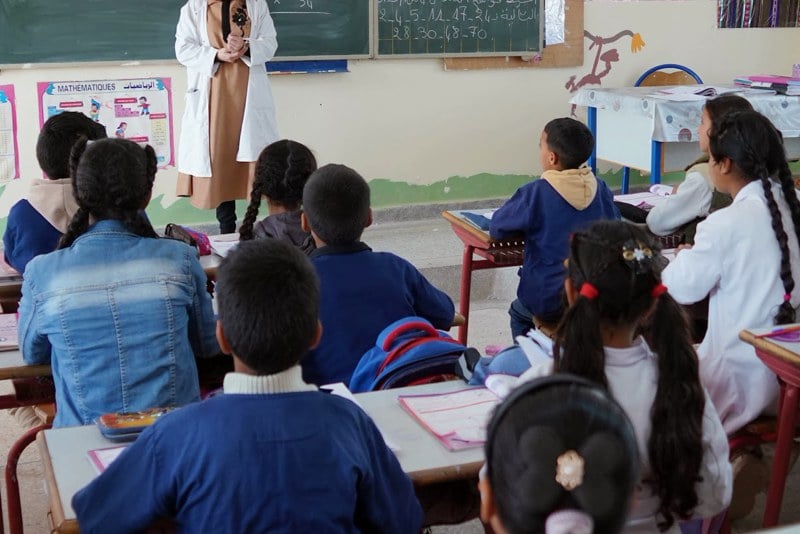Children in early education, aged three or four, embark on a new experience at the start of the school year, finding themselves for the first time in an environment different from home with its warmth and familiarity, transitioning to an organized school world based on new rules and relationships.
This early stage is accompanied by various emotions, as the child experiences a mix of surprise, anxiety, and fear due to temporary separation from their family and direct exposure to an unfamiliar environment; making the first days of school a distinctive psychological milestone in their childhood journey.
Jabir Mujahid, a professor and educational researcher, said, “Children entering school for the first time experience anxiety or fear due to entering school for the first time and being away from their family,” highlighting that “this psychological state causes the child to cry, reject, rebel, cling to the mother, and resist especially in the first days or weeks.”
Mujahid explained in a statement to Hespress electronic newspaper that “this phase does not last long, as the child gradually begins to rely on themselves; which helps boost their self-confidence,” confirming that “the transformations the child experiences depend on how well they are welcomed and prepared to integrate into the school environment.”
The same speaker emphasized that “teachers’ treatment of children in the first days plays a crucial role in facilitating adaptation to the new situation and reducing anxiety and tension, especially for the age group between three and four years, who are more sensitive to such situations.”
The educational researcher added that “welcoming children with a smile, encouraging phrases, and a warm, tender tone makes the child feel safe,” considering that “these simple behaviors leave a positive impact and help children love school from the start.”
Nada Al-Fadl, a clinical psychologist and therapist, said that “the child experiences their first contact with the school environment dominated by separation anxiety, often feeling fear and confusion due to being away from their parents for the first time, which may appear as continuous crying, clinging to the mother, or refusal to enter the classroom.”
Al-Fadl added in a statement to Hespress that “some children express curiosity and discovery, as school arouses their desire to explore the new place, games, and friends, while others may experience confusion and loss of security due to difficulty understanding new rules and feeling threatened by new people and the authority of the caregiver.”
The specialist explained that “emotional fluctuation is one of the most prominent psychological features at this stage, where the caregiver or parents may notice shifts between crying and laughing or between rejection and acceptance; this is normal in the first days of the school experience.”
Regarding when the situation is normal and when it indicates a psychological disorder, Nada Al-Fadl pointed out that “it remains normal if anxiety and crying last a few days to a maximum of two weeks, the child expresses their feelings and then gradually adapts to the place. Also, the appearance of simple integration signs such as playing, talking with children, or attachment to activities is a positive indicator.”
However, she noted that “the situation may become an indicator of psychological suffering if strong rejection and panic continue for weeks without improvement, or if repeated physical symptoms such as vomiting, stomach pain, or bedwetting occur only when going to school,” adding that “complete isolation, lack of communication with the caregiver or children, exaggerated aggressive behaviors, or extreme withdrawal, as well as absolute refusal to eat or play inside the classroom, are all worrying signs.”
The speaker confirmed that “these cases may be linked to separation anxiety disorder or difficulties in emotional and social development,” stressing that “it is advisable to consult a specialist if symptoms persist or worsen significantly.”
Regarding how to deal with these situations, Al-Fadl highlighted the importance of “preparation through explaining the idea of school to the child using stories or short visits to the institution before the start of the school year, adopting gradual separation by reducing the child’s stay duration on the first day and then gradually increasing it, with providing emotional reassurance by showing empathy for their feelings and confirming that they will see their parents soon.”
Nada Al-Fadl concluded by emphasizing the necessity of “cooperation between the caregiver and parents in providing reassuring messages, making the first day enjoyable with fun activities, encouraging the child for every small achievement, and maintaining daily routines in eating and sleeping.”













Recommended for you
Exhibition City Completes About 80% of Preparations for the Damascus International Fair Launch
Talib Al-Rifai Chronicles Kuwaiti Art Heritage in "Doukhi.. Tasaseem Al-Saba"
Egypt Post: We Have Over 10 Million Customers in Savings Accounts and Offer Daily, Monthly, and Annual Returns
Unified Admission Applications Start Tuesday with 640 Students to be Accepted in Medicine
His Highness Sheikh Isa bin Salman bin Hamad Al Khalifa Receives the United States Ambassador to the Kingdom of Bahrain
Al-Jaghbeer: The Industrial Sector Leads Economic Growth